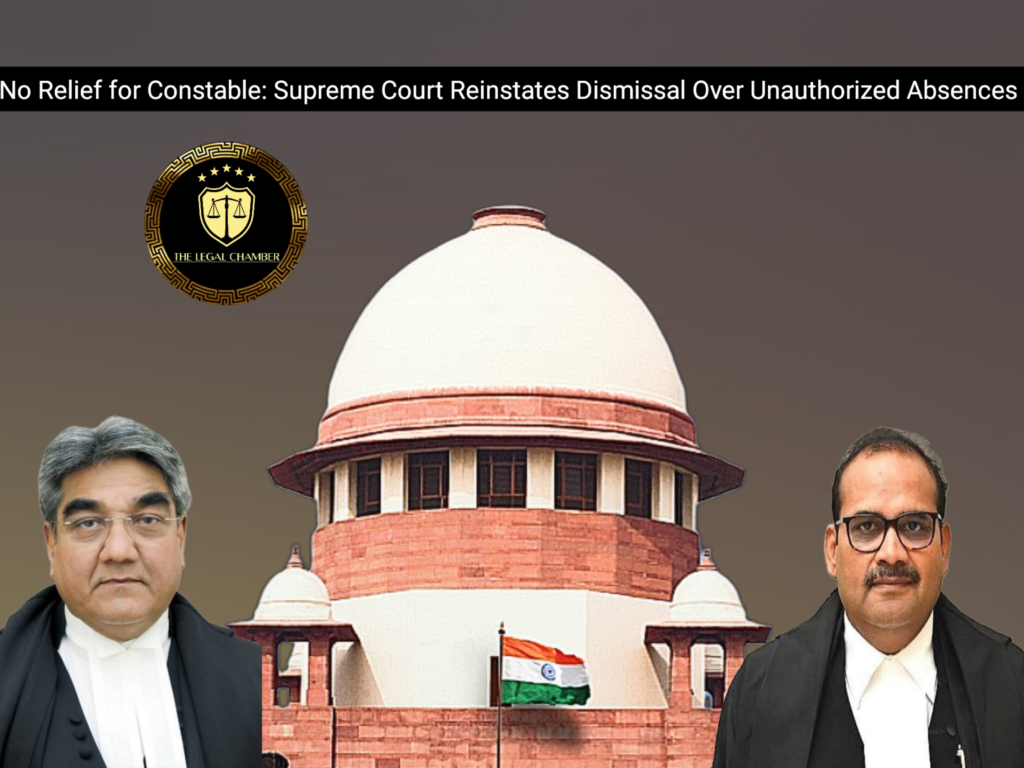
The Supreme Court ruled that while it is desirable to inform an employee if past misconduct will be considered for punishment, it is not mandatory when the current charge itself constitutes a “gravest act of misconduct.” In such cases, referring to past conduct merely to add weight to the decision does not vitiate the dismissal order, especially within a disciplined force where habitual absenteeism is a serious violation.
Facts Of The Case:
The respondent, Ex. Constable Satpal Singh, was appointed in the Punjab Armed Forces in 1989 and later transferred to the Commando Battalion. The immediate trigger for the case was his unauthorized absence from April 4, 1994, to May 12, 1994 (37 days), after he overstayed a one-day casual leave. A departmental enquiry was initiated for this absence, where he was found guilty. Following the enquiry, a show-cause notice was issued proposing his dismissal, to which he did not respond. The disciplinary authority subsequently dismissed him from service. While the dismissal order was primarily for the 37-day absence, it also made a reference to his past conduct, including the forfeiture of 17 years of service due to previous absences and pending enquiries. The respondent challenged his dismissal in civil court, which was dismissed, as was his first appeal. However, the Punjab and Haryana High Court allowed his second appeal, ruling that the dismissal was illegal as it relied on past misconduct not mentioned in the show-cause notice, violating the principles of natural justice. The State of Punjab then appealed this decision to the Supreme Court.
Procedural History:
The respondent’s dismissal order was first challenged through the departmental appellate and revisional authorities, both of which upheld the punishment. He then instituted a civil suit for declaration, which was dismissed by the Trial Court. His subsequent first appeal before the District Court was also dismissed. However, the respondent found success in the High Court of Punjab and Haryana through a second appeal, where a learned Single Judge set aside the dismissal, holding that the disciplinary authority had violated natural justice by considering past conduct not disclosed in the show-cause notice. This judgment of the High Court was then challenged by the State of Punjab before the Supreme Court, which, in the present judgment, allowed the appeal and restored the orders of the Trial Court and the first Appellate Court, thereby upholding the validity of the respondent’s dismissal.
READ ALSO:Supreme Court Acquits Mother-in-Law, Cites Lack of Evidence in Dowry Harassment Case
Court Observation:
The Supreme Court observed that the disciplinary authority’s reference to the respondent’s past misconduct was not the foundational basis for the dismissal but was merely used to add weight to the decision. It clarified that the principles laid down in K. Manche Gowda’s case, which require a notice for considering past conduct, are not inviolable when the present charge itself constitutes a “gravest act of misconduct.” The Court emphasized that habitual absenteeism, especially within a disciplined force like the police, is a grave misconduct that independently warrants the extreme penalty of dismissal under the first part of Rule 16.2(1) of the Punjab Police Rules, 1934. Consequently, the dismissal was upheld as it was based on a proven grave charge, and the procedural requirements for the second part of the rule, which considers the length of service for continued misconduct, were not applicable.
Final Decision & Judgement:
Case Details:
Case Title: State of Punjab and Others vs. Ex. C. Satpal Singh CITATION: 2025 INSC 1056 Appeal Number: Civil Appeal No. 312 of 2012 Date of Judgement: 29th August, 2025 Judges/Justice Name: Justice J.K. Maheshwari and Justice Vijay Bishnoi
Download The Judgement Here